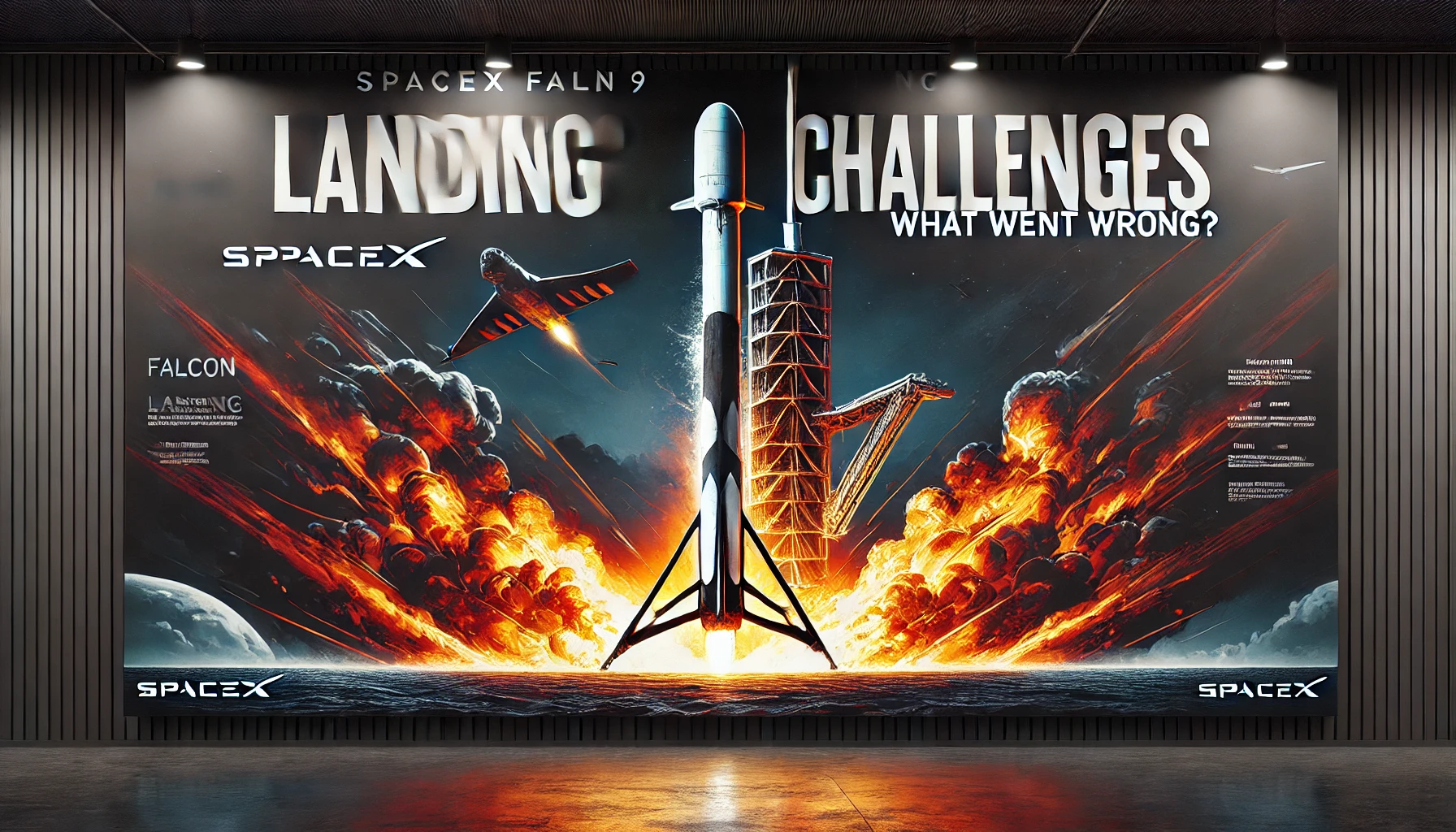Understanding SpaceX Falcon 9’s Landing Challenges: What Went Wrong During Recent Missions
Space exploration has always been fraught with challenges, but few companies have pushed the boundaries like SpaceX. The SpaceX Falcon 9 rocket, a workhorse of the company’s fleet, has become synonymous with reusable rocket technology and successful missions. However, recent events have spotlighted significant issues with the rocket’s landing process, raising questions about the reliability of these missions. This blog delves into the challenges SpaceX has faced with the Falcon 9’s landings, including the recent failures, the causes behind them, and the implications for the future of space exploration.
The Gravity of the Situation: SpaceX Falcon 9 Landing Failure
SpaceX’s reputation for innovation took a hit when the SpaceX Falcon 9 landing failure made headlines. The rocket, which had completed several successful landings, suddenly experienced a series of failures, causing it to crash during landing attempts. This SpaceX rocket crash landing not only drew attention from the media but also prompted an investigation by the Federal Aviation Administration (FAA).
The FAA investigation into SpaceX highlighted several issues, including potential flaws in the rocket’s landing legs and the stability mechanisms that ensure a safe touchdown. These failures were unexpected, especially given SpaceX’s track record of 267 consecutive successful landings before these incidents(livescience.com,Global News).
The most concerning aspect of these failures is their recurrence. The SpaceX Falcon 9 landing failure occurred not just once but multiple times within a short period. This has led to the Falcon 9 rocket being grounded twice in two months, a rare and worrying situation for SpaceX and its stakeholders(livescience.com,Global News).
Explosive Landings: Analyzing SpaceX Rocket Crash Landings
One of the most dramatic outcomes of these failures was the SpaceX rocket crash landing that ended in an explosion. During what was supposed to be a routine landing, the rocket tipped over after touchdown, igniting a fire that consumed the booster. The incident, broadcasted live, shocked many and brought to light the risks involved in pushing the boundaries of rocket reusability.
The SpaceX explosion during landing raised several questions about the design and reliability of the Falcon 9. SpaceX has since conducted internal reviews, and the FAA has mandated a thorough investigation to ensure public safety and the integrity of future missions. These failures have delayed several high-profile missions, including the Polaris Dawn mission, which was set to feature the first private spacewalk(Space.com,Global News).
The Impact of the Falcon 9 Rocket Being Grounded
The Falcon 9 rocket being grounded has had significant repercussions. Grounding a rocket, especially one as integral to SpaceX’s operations as the Falcon 9, disrupts the company’s launch schedule and delays crucial missions. The most notable delay has been to the Polaris Dawn mission, which was already postponed twice due to weather conditions. The grounding following the SpaceX rocket crash landing has pushed this mission even further back, affecting SpaceX’s plans and its reputation for reliability(Space.com,Global News).
The grounding also affected other missions, including the deployment of Starlink satellites. The SpaceX Starlink mission failure, where the upper stage of the rocket malfunctioned, further compounded the issues facing the company. This failure resulted in the loss of 23 satellites and was a major blow to SpaceX’s ambitious plan to create a global satellite internet network(Space.com,Global News).
FAA Investigation into SpaceX: Ensuring Safety and Accountability
The FAA investigation into SpaceX is not just a procedural formality; it is a critical process that ensures the safety of the public and the integrity of the space industry. The FAA’s role is to oversee SpaceX’s investigation into the SpaceX rocket crash landing and to verify that any corrective measures are effective.
This investigation has led to increased scrutiny of SpaceX’s operations, particularly in how the company addresses technical failures. The Falcon 9 booster failure and the subsequent SpaceX rocket crash landing have shown that even the most advanced technology can fail, necessitating rigorous checks and balances(Space.com,Global News).
The FAA’s involvement ensures that SpaceX is held accountable and that the necessary improvements are made to prevent future incidents. This process, while time-consuming, is essential for maintaining public trust and ensuring the long-term success of commercial spaceflight.
Learning from Failure: What’s Next for SpaceX?
Despite the recent setbacks, SpaceX remains committed to advancing its technology and improving the safety of its rockets. The Falcon 9 booster failure has provided valuable data that SpaceX can use to enhance the design and reliability of its rockets.
Looking ahead, SpaceX plans to implement several upgrades to address the issues identified in the FAA investigation into SpaceX. These upgrades include modifications to the rocket’s landing legs and improvements to the stability control systems. The goal is to ensure that future missions do not experience the same failures that led to the SpaceX rocket crash landing(Space.com,Global News).
SpaceX’s ability to learn from these failures and quickly adapt will be crucial as the company continues to push the boundaries of space exploration. The upcoming Polaris Dawn mission, once rescheduled, will be a significant test of SpaceX’s resilience and its ability to deliver on its ambitious goals.
Navigating the Challenges Ahead
The recent challenges faced by SpaceX, including the SpaceX Falcon 9 landing failure, SpaceX rocket crash landing, and the Falcon 9 rocket being grounded, have been significant setbacks. However, they also represent opportunities for growth and improvement. SpaceX has shown time and again that it can overcome obstacles and innovate in ways that few companies can match.
As the FAA continues its investigation, and as SpaceX works to resolve these issues, the future of space exploration remains bright. The lessons learned from these failures will undoubtedly lead to safer, more reliable rockets, paving the way for the next generation of space missions.
For more insights into the latest developments in technology and education, visit Regent Studies.
Stay updated on the latest in space exploration by following credible sources like Space.com and NASA.




